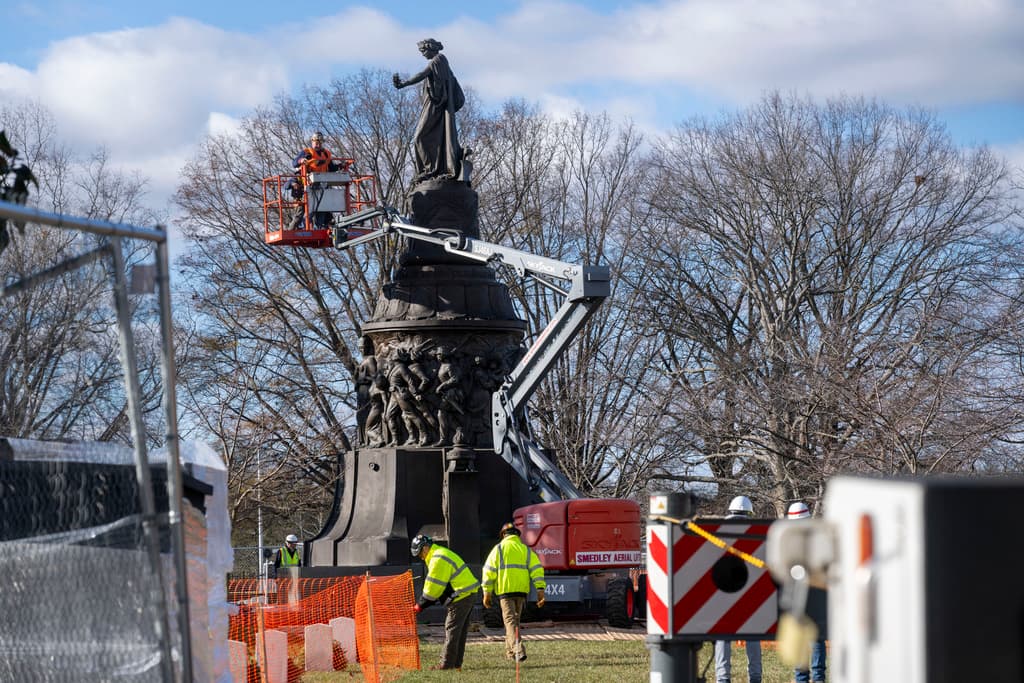The Confederate War Memorial — Hold Out for Reconciliation
It would be a mistake, in our view, to remove from Arlington Cemetery a memorial designed not to glorify an enemy but to beckon us all to reconciliation.

The reprieve a federal judge granted to the Confederate Memorial at Arlington cemetery offers a chance to weigh whether President Biden is moving with undue haste to remove what advocates like Senator Webb see as a symbol of post-Civil War reconciliation. The zeal to jettison the memorial, honoring the Confederate dead, raises fears that, amid a welcome reckoning over race in American history, the building blocks of national unity are being hollowed out.
On Monday Judge Rossie Alston ordered a temporary halt to efforts by the Defense Department to remove the memorial from the grounds of the national military cemetery. The ruling came at the behest of a group called Defend Arlington, which contends “the removal will desecrate, damage, and likely destroy the Memorial.” A hearing is scheduled for Wednesday. That offers a valuable, if brief, respite to reflect on the merits of keeping the memorial in place.
Defense argues that Congress ordered Confederate names and monuments stripped from its facilities. Mr. Webb, a Navy Secretary, Annapolis graduate, and Marine officer who appeared in arms in Vietnam, has pointed to his tenure on the Armed Services Committee to convey doubt that Congress meant to remove “this memorial, conceived and built with the sole purpose of healing the wounds of the Civil War and restoring national harmony.”
Mr. Biden’s Defense Department could well have overstepped its authority in the case of the memorial. Yet Mr. Webb raises a more important concern. The drive to cast out a memorial to the Confederate dead, he suggests, reflects an “atrophied understanding of the Civil War itself.” Central to that understanding is an awareness of the scale of the military deaths: 2 percent of Americans fell in the war. The equivalent today would be some six million.
“The scale and duration of the conflict, the size of its battles and the number of casualties were,” as Harvard’s Drew Gilpin Faust notes, “unanticipated and unprecedented.” Both North and South experienced a “harvest of death,” she reckons, and the nation was “unprepared for the impact of these deaths; what to do with the bodies that covered fields of battle, how to mourn so many lost, how to remember, and how to understand.”
The Confederate Memorial at Arlington was an attempt to grapple with the losses in a way that transcended the war’s political divisions. Mr. Webb calls its inscription “the finest explanation of wartime service perhaps ever written.” It reads: “Not for fame or reward, not for place or for rank; not lured by ambition or goaded by necessity; but in simple obedience to duty as they understood it; these men suffered all, sacrificed all, dared all, and died.”
Mr. Webb is among those lamenting that this expression of remembrance is under threat “in this new world of woke” and that its removal will exacerbate “bitterness and misunderstanding conjured up by those who do not understand the history they seem bent on destroying.” This is not to ignore the political undertones that accompanied the construction of many Confederate memorials in the post-Reconstruction era.
The New York Sun does not support the Lost Cause movement. The early editors who flew the flag of the Sun declared for abolition with the fourth issue of the paper. Its great 19th century editor, Charles Dana, rode with Grant and served under Lincoln. We’re aware that any honest reading of American history will acknowledge that many post-Civil War monuments celebrated the very Lost Cause movement we eschew.
Wholesale removal, though, of historic monuments, extending even to Lincoln and Jefferson, is an overreaction. Reconciliation can be pursued without betraying the cause of the Union, abolition, or civil rights. The Arlington memorial, in any event, is largely devoid of political baggage. Its message is simpler: to honor the dead, even if their cause was unjust. “Let us judge not, that we be not judged,” is how Lincoln put it. “The Almighty has his own purposes.”

